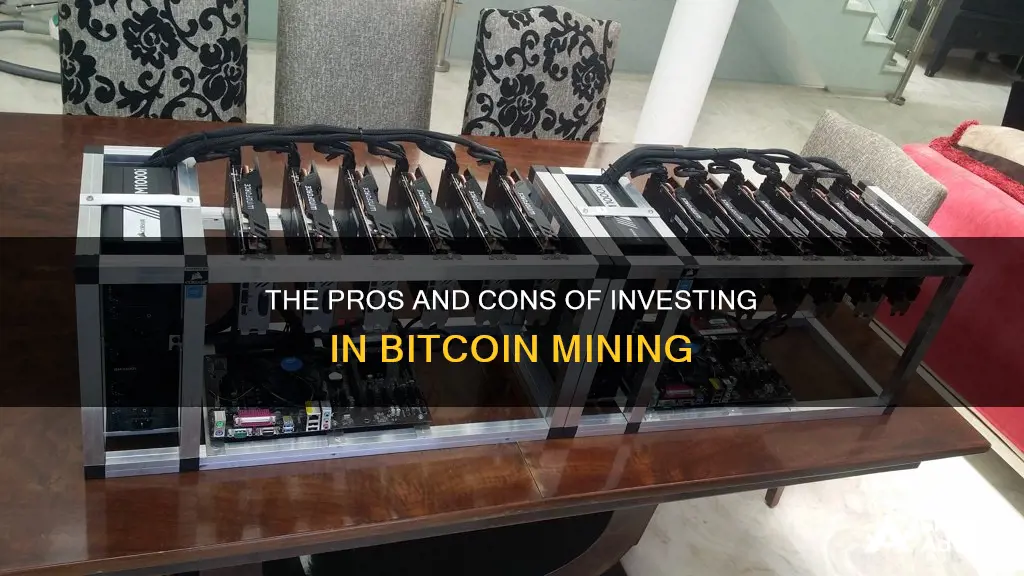
Bitcoin mining is a process that creates new Bitcoins and releases them into circulation. Bitcoin miners are responsible for confirming transactions and creating new coins; they receive Bitcoin rewards for their efforts. Bitcoin mining is necessary to maintain the ledger of transactions upon which Bitcoin is based.
Miners have become very sophisticated over the years, using complex machinery and grouping to speed up mining operations. Bitcoin mining has also generated controversy because it is not considered environmentally friendly.
Bitcoin mining can be a profitable endeavour, but it is important to carefully consider the risks and costs before investing. The value of many cryptocurrencies has increased significantly over the years, and mining can be a good way to earn a return on investment. However, it can be expensive to set up and maintain a crypto-mining operation, and there is no guarantee that mined coins can be sold for a profit.
| Characteristics | Values |
|---|---|
| Purpose | To validate transactions and mint new coins |
| Process | Miners compete to solve complex math problems using cryptographic solutions |
| Reward | Bitcoin and fees for work done |
| Requirements | Specialized hardware, software, electricity, and internet connection |
| Risks | High costs, competition, environmental concerns, safety hazards, regulatory changes |
| Profitability | Depends on costs, Bitcoin price, hash rate, efficiency, electricity prices |
| Taxation | Varies by jurisdiction; income may be taxed as ordinary income or capital gains |
What You'll Learn

What is Bitcoin mining?
Bitcoin mining is a process that creates new Bitcoins and releases them into circulation. It is crucial to the operation of Bitcoin and some other cryptocurrencies because it incentivizes users to enter accurate information into the shared ledger that keeps track of transactions and balances on an underlying blockchain network.
Miners who participate in this process compete for rewards in the form of Bitcoin. They use hardware and software to generate a cryptographic number that is equal to or less than a number set by the Bitcoin network's difficulty algorithm. The first miner to find the solution to the problem receives bitcoins as a reward, and the process begins again. This reward is an incentive that motivates miners to assist in the primary purpose of mining: to earn the right to record transactions on the blockchain for the network to verify and confirm.
Bitcoin mining involves solving complex cryptographic hash puzzles to verify blocks of transactions that are updated on the decentralized blockchain ledger. Solving these puzzles requires powerful computing power and sophisticated equipment. In return, miners are rewarded with Bitcoin, which is then released into circulation.
Bitcoin mining is necessary to maintain the ledger of transactions upon which Bitcoin is based. Miners have become very sophisticated over the years, using complex machinery and grouping to speed up mining operations.
Bitcoin mining has also generated controversy because it is not considered environmentally friendly.
Why Bitcoin: Benefits of Investing in Cryptocurrency
You may want to see also

How does Bitcoin mining work?
Bitcoin mining is the process of validating and recording transactions on the Bitcoin network. It is a network-wide competition to generate a cryptographic solution that matches specific criteria. The process also releases new Bitcoins into circulation.
Bitcoin mining involves solving complex cryptographic hash puzzles to verify blocks of transactions that are updated on the decentralised blockchain ledger. Miners use specialised, high-energy computers, or nodes, to repeatedly guess the solution until they find it. The more computing power a miner has, the more attempts they can make to solve the puzzle.
The first miner to find the solution is rewarded with Bitcoin and fees for the work done. This is an incentive to continue mining. The reward for mining is halved every four years and will continue to do so until all 21 million Bitcoins are in circulation, which is expected to be reached around 2140. After this, miners will only earn from transaction fees.
The Bitcoin mining process can be broken down into the following steps:
- A transaction is made between wallets.
- The addresses and amount are entered into a block on the blockchain.
- All the data in the block is put through a cryptographic algorithm (hashing).
- The result of hashing is a 64-digit hexadecimal number, or hash.
- Miners guess a number that is lower than the target hash by adjusting the nonce.
- When a miner finds the solution, it is added to the blockchain, and the miner is rewarded.
- The process begins again.
Myanmar's Bitcoin Investment: A Beginner's Guide
You may want to see also

Is Bitcoin mining profitable?
Bitcoin mining can be profitable, but it requires a significant upfront investment in hardware and ongoing energy costs.
Bitcoin mining is the process of creating new bitcoins by solving extremely complicated math problems that verify transactions in the currency. When a bitcoin is successfully mined, the miner receives a predetermined amount of bitcoin.
The most powerful Bitcoin mining equipment, known as ASICs, cost thousands of dollars. Bitcoin mining is also energy-intensive, so electricity costs must be considered. Additionally, the price of Bitcoin itself impacts profitability. When prices are high, profits increase, as Bitcoin mining rewards are paid in BTC tokens.
However, there is no definitive way to know how much money one will make from Bitcoin mining due to various variables. For instance, the Bitcoin mining difficulty increases when competition is higher, meaning extra hashing power is needed to compete.
To increase their chances of success, miners can join a mining pool, sharing resources and adding more capability. However, shared resources mean shared rewards, so the potential payout is less.
Another option is cloud mining, which enables individuals to mine Bitcoin remotely without purchasing any equipment.
Overall, while Bitcoin mining can be profitable, it requires a substantial investment and carries risks. It is crucial to research and carefully consider all factors before embarking on a Bitcoin mining journey.
Investing $1000 in Bitcoin: Is It Worth It?
You may want to see also

How to start Bitcoin mining
Bitcoin mining is the process of creating new bitcoins by solving extremely complicated math problems that verify transactions in the currency. When a bitcoin is successfully mined, the miner receives a predetermined amount of bitcoin.
- Get a Bitcoin wallet: You will need a place to store your bitcoin, so you will need to get a Bitcoin wallet. There are several options available, such as a software wallet, which you can download to your computer, or a hardware wallet, which is a physical device that you can use to store your BTC offline.
- Get mining software: There are several providers of mining software, many of which are free to download and can run on Windows and Mac computers. Once the software is connected to the necessary hardware, you will be able to mine Bitcoin.
- Get computer equipment: This is the most cost-prohibitive aspect of Bitcoin mining. You will need a powerful computer that uses an enormous amount of electricity to successfully mine Bitcoin. It is not uncommon for the hardware costs to run around $10,000 or more.
- Join a mining pool: Joining a mining pool will increase your chances of earning new BTC, as the mining pool will combine their computing power to increase the chances of finding a block and earning a reward.
- Start mining: Once you have set up your wallet, software, and computer equipment, and joined a mining pool, you can start mining Bitcoin. The amount of BTC you can mine will depend on several factors, including the power of your mining rig, the cost of electricity, and competition from other miners.
Bitcoin vs Gold: The Future of Investment Portfolios
You may want to see also

Risks of Bitcoin mining
Bitcoin mining is a competitive process that involves using computers to solve complex mathematical problems to validate transactions on the blockchain, for which successful miners are rewarded with Bitcoin. While it can be lucrative, there are several risks associated with Bitcoin mining that potential investors should be aware of:
Price Volatility: Since miners are paid in Bitcoin, the highly volatile price of Bitcoin poses a significant revenue risk. The value of Bitcoin can fluctuate due to various factors, such as changes in demand, regulatory scrutiny, or environmental concerns.
Increased Competition: As more miners join the network, the competition to validate transactions and earn Bitcoin rewards becomes more intense. This increased competition makes it harder for individual miners to win blocks and receive rewards.
Operational Risks: Bitcoin mining operations face various operational challenges, including potential issues with internet connectivity, overheating of mining hardware, and the risk of system hacks or cybersecurity threats. While the large size and decentralised nature of the Bitcoin network make it relatively secure, the risk of cyber-attacks or technical failures cannot be completely eliminated.
Electricity Availability and Cost: Reliable and affordable electricity is crucial for Bitcoin mining operations. Miners need to ensure a stable and redundant power supply to avoid disruptions. Additionally, the cost of electricity is a significant factor in determining the profitability of mining operations. Higher electricity prices can make mining unprofitable, especially for small-scale miners.
Regulatory Environment: The regulatory landscape for cryptocurrency mining is evolving, and miners need to stay informed about changing policies. Some countries have imposed restrictions or banned mining activities due to energy consumption concerns, while others offer incentives to attract mining investments. Non-compliance with regulations can lead to legal issues and financial losses.
Environmental Impact: Bitcoin mining consumes a significant amount of energy, leading to concerns about its environmental impact and carbon footprint. Public scrutiny, negative perceptions, and pressure from environmental groups can pose reputational risks for miners. Additionally, some companies and investors may reconsider their involvement in Bitcoin mining due to sustainability goals and environmental considerations.
Webull's Guide to Bitcoin Investment
You may want to see also
Frequently asked questions
Bitcoin mining is the process of validating Bitcoin transactions and minting new coins. Miners confirm each block of transactions and add it to the blockchain. For their efforts, miners receive Bitcoin rewards.
Bitcoin miners compete to solve complex mathematical problems that require the use of expensive computers and vast amounts of electricity. The first miner to solve the problem receives a predetermined amount of Bitcoin as a reward.
It depends. Even if Bitcoin miners are successful, the high upfront costs of equipment and ongoing electricity costs may outweigh their earnings.
To start mining Bitcoin, you'll need a wallet, mining software, and computer equipment. You'll also need to join a mining pool, as it's very difficult to mine Bitcoin solo.







